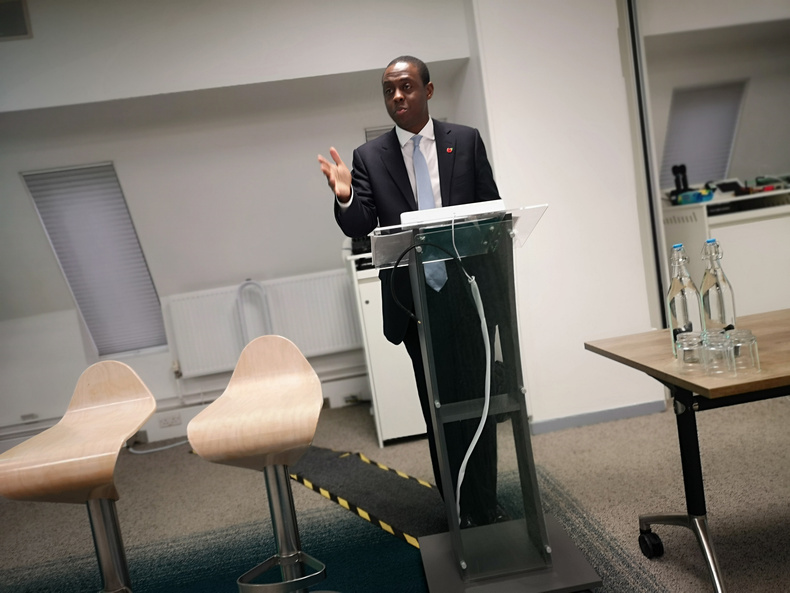Chamber summit: Innovative firms 'can lead green industrial revolution '

Innovation is crucial to kickstarting the green industrial revolution and achieving the UK 's net zero goals, a Chamber summit heard, writes Dan Harrison.
But Conservative MP and net zero champion Bim Afolami said more must be done to incentivise businesses to invest in the field of climate change.
Mr Afolami (pictured) was addressing delegates at the Sustainable Business Summit, hosted by the Greater Birmingham and Coventry & Warwickshire Chambers of Commerce at Conference Aston.
The Hitchin & Harpenden MP, who chairs the All-Party Parliamentary Group for Renewable and Sustainable Energy, said that while there is a high cost to transitioning to net zero, it outweighs the potential damage caused by a lack of action.
But he believes the 'green industrial revolution ' also provides many opportunities for business.
Mr Afolami said: “If you think back to the industrial revolution, this country 's transformation from what was effectively a middling European power to being the No.1 nation in the world because we were the first movers in the adoption of new technologies.
“This adoption of new technologies allowed for new manufacturing processes which transformed the basis of our economy.
“I believe that the net zero transition can do the same thing in the 21st Century. The economic opportunities in being the first mover in the applied technologies of carbon capture and storage, nuclear fusion, green and blue hydrogen, ever-improving battery technology will outgrow meat and many other things. It will be transformative for this country.
“Wealth and prosperity and positive improvement is not by government. It is determined by that sense of purpose and you know that with your people who work in your businesses - that sense of purpose and a positive culture around innovation.
“It is that which the green industrial revolution gives us a chance to harness. I think that will allow us to grow our economies much more than they have in the past. ”
On incentivising and encouraging businesses through the net zero transition, Mr Afolami added: “If we want to do something like this and change people 's lives, if it doesn 't benefit people, they won 't do it.
“We need to make it financially extremely attractive to invest in and innovate in the field of climate change. ”
Delegates also heard from Tom Anderson, CEO of Grid Edge - a start-up firm that helps buildings lower their energy consumption and reach net zero through data.
Mr Anderson explained to the summit how Grid Edge is harnessing AI technology to manage energy consumption in public and commercial buildings.
He said that 80 per cent of operational CO2 emissions come from heating, cooling and comfort management systems.
“Data should enable you to see things that were invisible to you and then empower you to make better decisions, ” said Mr Anderson.
The first of two panel discussions covered the financial case for sustainability.
Speakers Hisham Farag (director of Sustainable Finance Innovation Research Centre, University of Birmingham), Laura Suffolk (regional director for the West Midlands, NatWest), Chris Reeves (head of Autonomous and Connected Vehicles at Horiba Mira) and Sarah Windrum (Chair, Coventry and Warwickshire Local Enterprise Partnership) covered a range of topics from the financial incentives available for businesses to the standardisation of electric car chargers.
Mr Reeves, whose firm Horiba Mira provide automotive engineering, research and test services, said that standardisation of chargers for electric vehicles should be made a priority to enable “mass consumer consumption. ”
A second panel then discussed the role of businesses in net zero.
Richard Kirkham, operations director of construction firm Morgan Sindall, said that the availability of cash has been one factor limiting businesses in their net zero targets.
HS2 Ltd 's Emma Head outlined the high-speed rail project 's green credentials.
When delivering the new railway, the organisation is planting thousands of trees and installing cycle paths - while its wider aim is to take freight vehicles off the roads.
Juliet Mian, director of Infrastructure Resilience at global design, engineering and planning consultancy Arup, described the wealth of opportunities provided by net zero and how it is “transforming our industry for a better future. ”
The Sustainable Business Summit rounded off the month-long Chambers ' Sustainable Business Series: Net Zero campaign.
The campaign - sponsored by Aston University, Morgan Sindall, Arup and University of Birmingham - featured four weeks of webinars and digital content designed to help businesses on their journey towards net zero.
Find out more about the campaign here.
